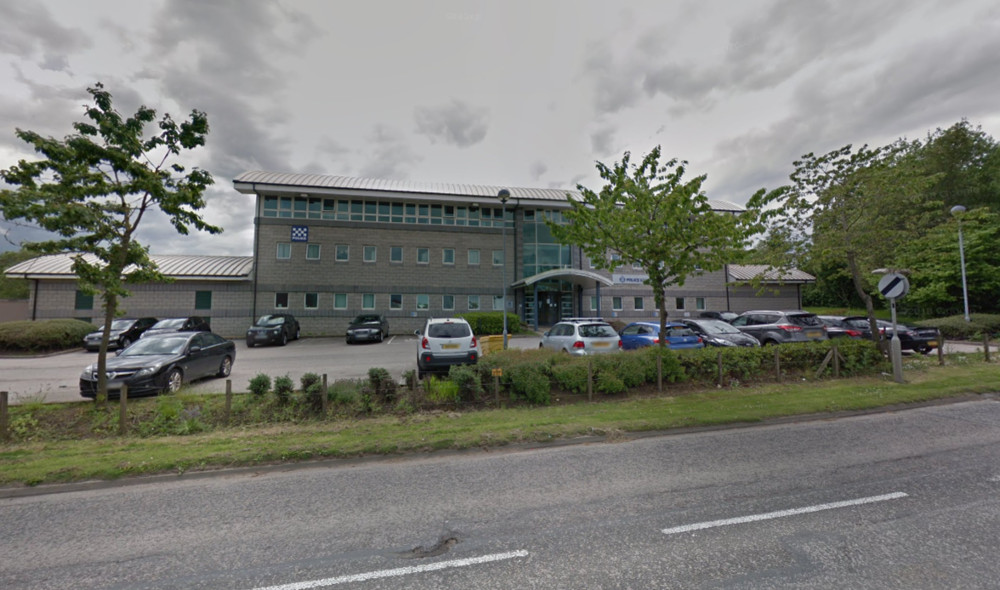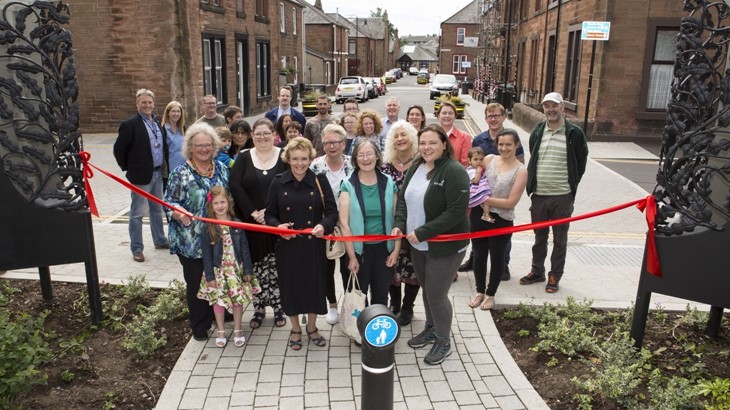Building Briefs – December 11th
- Police Scotland fails in bid to build flats in Inverurie
Plans by Police Scotland to build flats on the grounds of an Inverurie police station have been refused by Aberdeenshire Council.

Police Scotland’s Inverurie office (Picture: Google Street View)
The force had lodged plans to build nine two-bedroom flats within a three-storey block inside land by the station on Blackhall Road.
The proposals form part of Police Scotland’s larger programme to dispose of land across Scotland.
Dundee-based agents Graham+Sibbald put in a request to Aberdeenshire Council last December to get feedback on the potential development of the area.
The council were presented with two options of a nine-flat residential scheme or a commercial drive-through. Again, in February this year, two options were presented to the council, which opted for the residential scheme.
The site does include a variety of aged trees, 61 of which would have had to be removed to make way for the development.
However, a refusal notice issued by planners stated: “The applicant has not satisfactorily demonstrated a public, economic or social benefit that outweighs the loss of the area designated as ancient woodland and has not demonstrated that there is no reasonable alternative site for the development.”
It also noted: “The indicative siting of the proposed flatted development and associated works are unacceptable and the Planning Service has no confidence based on the information available that the site can accommodate this level of development resulting in concerns with the potential visual impact of the building and impact on the character of the area.”
- Sustrans Scotland’s Street Design programme to open for applications in 2020
Sustrans Scotland’s Street Design programme will be open for applications in the new year.

Funded by the Scottish Government, Sustrans Scotland’s Street Design programme is an award-winning design and engagement service, empowering communities to transform their neighbourhoods and urban spaces
Streets and public spaces are the connective tissue that hold communities together. The quality of these spaces can be the difference between a place you consider to be ‘home’ ending at your front door or extending to your entire neighbourhood.
The last century has seen car ownership become the norm. With that, streets have changed from this connective tissue of communities to large, vascular routes helping to enable a steady flow of motor traffic. This has impacted on the way we use our streets, from the way we travel, to where we and our children spend time, to our health and wellbeing.
Our streets should be more than carriageways for vehicles. They can be green corridors for urban wildlife, informal playgrounds for children walking home from school, and places where bumping into neighbours can turn them into friends.
Creating high-quality public spaces that prioritise people over cars can encourage people to take more journeys on foot, bike or other active transport modes, reducing their carbon footprint.
Something as simple as a bench can help to create a sense of place. It is somewhere to read a book or have a conversation with a friend. And when people spend more time on their streets, they’re also more likely to stop and shop, which is good news for local economies.
Sustrans Scotland’s Street Design team has been working directly with communities for over a decade, reimagining streets to create more liveable neighbourhoods for everyone. Their approach hinges on involving communities from the beginning of the design process and the result is a legacy that extends far beyond the completion of the design.
By enabling communities to take an active role in developing their own ideas for how they want their neighbourhoods to look and feel, Sustrans’ Street Design projects empower local people to make improvements to their local area. This also has the benefit of helping people play a more active role in their community after the project has ended.
A great example of this is in Dumfries. Taking part in on-street events and design workshops as part of the project inspired residents and businesses to work together and form a constituted community group that is still maintaining and improving their street environment to this day.
When streets are created for people rather than vehicles, they provide opportunities for better social connections, thriving local economies and more sustainable living. More than that, giving people a say in the design of their streets can produce more active and empowered communities.
Applications for the Street Design Programme will open again in early 2020. It is looking for applications from organisations that can demonstrate an identified problem to solve, aspirations, governance structure, and opportunities.
More information about the application process is available here.
- Tayside apprentice scheme marks fourth year in operation
Shared Apprentice, the first of its kind scheme in Scotland, has marked major milestone having been in operation for four years.

The first construction apprentices graduated in November and all of them have been offered jobs. Most of them decided to stay in construction trade working locally across Tayside region. Only one apprentice graduate decided to change the career, however he has a trade under his belt which he can always go back to.
The scheme is aimed to make life easier for small and medium size companies. It covers the cost of apprentices during their time at the college with employers only needing to cover their wages when they are on site.
Grant Wilson of Sturrocks Joinery, Kirkbuddo, said: “I am more than happy with the Shared Apprentice Scheme, they have provided me with quality recourses and at the end of it I have got a fully qualified joiner.”
Kevin Murphy, director of Curriculum and Attainment at D&A College and chairman of Shared Apprentice Ltd, said: “This is a wonderful achievement that all apprentices from our first cohort have been offered full-time employment.”
Mr Murpyh also said the success wouldn’t have been possible without great partnership between local construction companies and public sector organisations including Angus Council, CITB, Dundee & Angus College, Dundee City Council, Andrew Shepherd Construction, Pert Bruce Construction, Robertson Construction and support from CITB and SDS, not to mention all great companies who took opportunity and offered placements to our apprentices.
- Mactaggart & Mickel grows links with Laburnum Learning Centre
Mactaggart & Mickel’s Building Communities Fund has contributed £1,000 to the Laburnum Family Learning Centre based in Uddingston to go towards new outdoor learning facilities.
The nursery provides care and education for up to 158 children aged from two to five years, working closely with parents and families to help improve outcomes for young people. The outdoor activity area is currently in progress and will, once finished, provide a stimulating environment where the children can explore, create and learn.
This donation follows on from a previous neighbourly gesture by Mactaggart & Mickel’s Timber Systems division, which is based in Bellshill just a few miles from the nursery. After being approached by the nursery requesting some scraps of wood to make a sandpit, the Timber Systems team were only too happy to build, deliver and install one for them.
The new funds will be used to purchase extra outdoor resources including new waterproof suits and wellies for the children, a garden play frame, plants and tools and some balance bikes.
The value of outdoor learning is well understood to have a highly positive impact on children’s wellbeing, particularly to those who do not have access or opportunities at home to experience quality outdoor play.
The Building Communities Fund was established to enhance the company’s ongoing efforts to help organisations and projects which enhance the lives of people within their local communities.
- Sales set to hit £4m at Midlothian glamping pod company
A Midlothian luxury glamping pod company is creating ten jobs as it forecasts turnover will double to more than £4 million.
Armadilla, which produces eco-friendly structures for the upmarket glamping sector, estimates revenues will rise to £4m over the next 18 months, as the business looks to capitalise on growing demand for the luxury pods.
This follows a two-year spell of rapid expansion which has seen sales at Armadilla increase by almost 300 per cent, soaring from £550,000 to £2m.
Headcount also swelled from 12 to 38 during the period, with Armadilla planning to create ten further jobs in the coming year.
Originally based in Rosewell, the business moved to 25,000 square foot premises in Bonnyrigg last year to accommodate growth.
The firm was established in 2010 by former farmer Archie Hunter and his son Ross, a product designer, following their success in building an eco house two years earlier using salvaged materials from an old nun’s chapel, a disused police station and a neglected tollhouse.
It now works with clients across the UK as well as overseas, including hotel chains throughout the Middle East and Australia and a retreat in California owned by ‘Juice Master’ Jason Vale.
It also has sales representatives based in Dubai and Chile.
- CALA Homes funds primary school playground improvements
A primary school in Renfrewshire is celebrating after receiving a helping hand from CALA Homes (West).
(from left) Sophie Rankin, Eva McSkimming, CALA Homes (West) marketing manager Louise Dunn, Murray Williamson, Euan Duncan
Rashielea Primary School in Erskine has seen its playground given a new lease of life thanks to funding from the award-winning homebuilder.
The £1,000 donation was awarded via CALA Homes’ annual community bursary scheme following an application by the school’s Parents’ Association.
Rashielea’s Parents’ Association has been working to raise funds to improve the playground to ensure pupils can learn and develop whilst having fun outside of the classroom.
The funding from CALA Homes (West) has gone towards new play climbing equipment for the school’s outdoor area.
Louise Dunn, marketing manager at CALA Homes (West), visited the school to see the new equipment funded by the homebuilder, and hear more about the Parents’ Association’s work to enhance the school’s existing facilities.










